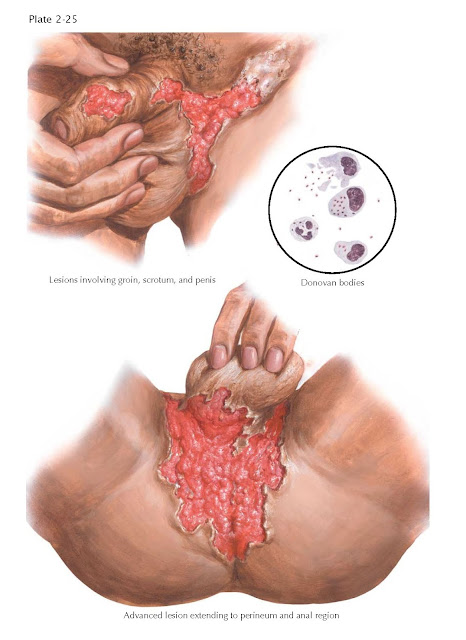GRANULOMA
INGUINALE
Granuloma inguinale (also known as “Donovanosis”) is
a sexually transmitted bacterial infection of endemic proportions in many
underdeveloped countries. The pathognomic feature of the disease are Donovan
bodies on Giemsa or Wright stain, intracellular inclusions representing the
causative gram negative
Klebsiella granulomatis bacteria that have been engulfed by mononuclear
phagocytes. Clinically, granuloma inguinale is characterized by painless
genital ulcers that appear 10 to 40 days after contact and that can be mistaken
for syphilis. However, unlike syphilis, they can progress to mutilate and
destroy tissue and are often superinfected with other pathogenic organisms. The
lesions occur in the region of contact, which is typically the penile shaft or
perineum, and contain Donovan bodies when the superficial layers of the ulcer
are scraped or when stained granulation tissue is examined.
The
earliest sign of the infection is a tiny macule that develops into a papule and
finally a creeping, serpiginous, painless ulcer. Extensive and luxuriant
granulations cover the ulcer base with considerable epithelial proliferation
around the margin. No large abscesses develop, as in chancroid, but small
necrotic areas are observed. Systemic symptoms and lymphadenopathy do not
ordinarily accompany this infection. Granuloma inguinale must be differentiated
from the other chronic ulcerative infections such as chancroid, chronic streptococcal
infection and syphilis. In later stages, granuloma inguinale may look like
advanced genital cancers, lymphogranuloma venereum, and cutaneous amebiasis. In
cases that do not respond to curative antibiotics and surgical excision,
carcinoma must be considered. The diagnosis is made by smears of scrapings from
lesions, as the bacteria do not grow in ordinary culture media. Although an
infection may begin to reside after 7 days of treatment, a full 12 weeks of antibiotics is
essential. Approximately 10% of healed lesions may relapse months later because
the Donovan bodies persist beneath healed skin, mandating further treatment.
Complications of granuloma inguinale infection include genital mutilation and
scarring, loss of skin color in the genital area and genital elephantiasis from
scarring. Occasionally, bacteria spread hematogenously to the bones, joints, or
liver; without treatment, anemia, wasting, and uncommonly death may occur.





